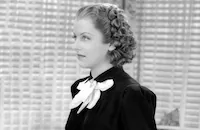Professional Sweetheart

Brief Synopsis
Cast & Crew
William A. Seiter
Ginger Rogers
Norman Foster
Zasu Pitts
Frank Mchugh
Allen Jenkins
Film Details
Technical Specs

Synopsis
Frustrated by the pristine routine by which her sponsor, Sam Ipswich of Ippsie Wippsie Wash Clothes, forces her to live, radio celebrity Glory Eden, the "Purity Girl," refuses to sign her new contract until she is allowed "to sin and suffer." Desperate to placate the Midwestern orphan, Sam gives in to the suggestion of Speed Dennis, his press agent, to bring one of Glory's male fans to New York as her "professional sweetheart." From a pile of fan letters, Glory picks Kentuckian Jim Davey, a "brand new virgin" of the "purest Anglo-Saxon stock." As part of his publicity scheme, Speed convinces the hillbilly Jim to come to New York, then introduces him to the radio gossip columnists as Glory's new love. Eventually Speed talks the naïve Jim into proposing to Glory, who happily accepts, and a new round of publicity ensues. Just before the wedding, Jim is approached by O'Connor, the press agent for Kelsey's Dish Rag Company, to convince Glory to leave Sam and perform briefly for Kelsey. Because Glory has confessed to Jim that she is miserable playing the Purity Girl, Jim agrees to prevent her from signing Sam's new contract. However, when Jim discovers that O'Connor wants Glory to sign a long-term contract with Kelsey, he refuses to cooperate, causing O'Connor to reveal the truth behind Speed's publicity gags. A disillusioned, angry Jim then whisks Glory to Kentucky after their "on the air" marriage, leaving both Sam and Kelsey without a singer. Although at first furious about her "kidnapping," Glory is "tamed" by Jim and soon learns to love country life. Still determined to win Glory back, Speed drives to Kentucky and begs her to listen to the Ippsie Wippsie Hour one last time that night. He then hires Vera, Glory's black maid, to sing in Glory's place, sure that Glory will be envious of Vera's success. As predicted, Glory's ambitions are rekindled by the sound of Vera's sultry voice, but because his contract has no "morality clauses," Glory signs with Kelsey. As a counter move, Speed signs the poetry-reading Jim to a contract. When Jim refuses to perform without Glory, however, Sam and Kelsey agree to merge into the Ippsie-Kelsey Clothiers, and the show finally goes on.

Director

William A. Seiter
Cast

Ginger Rogers

Norman Foster

Zasu Pitts

Frank Mchugh

Allen Jenkins

Gregory Ratoff

Franklin Pangborn

Lucien Littlefield

Edgar Kennedy
Frank Darien

Sterling Holloway
Theresa Harris

Betty Furness
Crew
Harry Akst
Carroll Clark
Merian C. Cooper
Edward Cronjager
Robert De Grasse
George Diskant
Edward Eliscu
Guy Gilman
Kenny Holmes
Alexander Kahle
Jim Kirley
James B. Morley
Van Nest Polglase
Clem Portman
Dewey Starkey
H. N. Swanson
Maurine Watkins
Roy Webb

Film Details
Technical Specs

Articles
Professional Sweetheart
Professional Sweetheart was one of several comedies produced in the thirties that poked fun at the growing popularity of radio, where stars often bore no resemblance to the characters they played on the air. Known for her witty barbs and satiric humor, former newswoman Maurine Dallas Watkins was hired by RKO to write the script. Watkins had been a one-play wonder on Broadway, but what a play. She used her experiences as a courtroom reporter to create Chicago, a trenchant expos¿f justice as show business that still delights audiences as the basis of the hit stage and screen musical of the same name. The play also provided Rogers with one of her best starring vehicles, Roxie Hart, in which she played the chorus girl wannabe who would later prove a potent star role for Gwen Verdon on stage and Renee Zellweger on screen.
But that was almost a decade away when Rogers took on the role of Glory Eden. She had been knocking around the movies since the coming of sound, with a brief break to star on Broadway in the Gershwin musical Girl Crazy. Rogers had played leads in low-budget films and supporting roles in bigger pictures, most noticeably as a wise-cracking chorus girl in 42nd Street and Gold Diggers of 1933 (both 1932). She'd even teamed with Foster before, though they had only flirted in 1930's Young Man of Manhattan, while established star Claudette Colbert got him in the final clinch.
After Rogers' success in the Warner Bros. musicals, Harry Cohn, head of production at Columbia Pictures, had asked her to test for a contract. He turned her down because he thought her smile too big, but that didn't stop him from making a pass at her. When Rogers threatened to tell his wife, he backed off, but he was a good enough sport to send her test to RKO, where executives were looking for a new leading lady. They signed Rogers to a three-picture deal at $1,600 a week. Oddly, they weren't that impressed with her singing. For the only time in her career, she was dubbed. The real singer of "My Imaginary Sweetheart" was Etta Moten, a black singer who had soloed impressively on "Remember My Forgotten Man" in Gold Diggers of 1933. It was the only real gripe Rogers had about making Professional Sweetheart. Regarding her dubbing, she wrote (in her autobiography Ginger My Story), "I was amazed and annoyed. I had been singing professionally on the stage and screen for years and thought it ridiculous to hear someone else's voice coming out of my mouth."
Professional Sweetheart went through two other titles -- Careless and The Purity Girl -- before it hit the screen. It also got a new title in England. Censors there thought Professional Sweetheart sounded like a film about the world's oldest profession, so they called it Imaginary Sweetheart. But whatever the title, the film brought Rogers strong reviews and a chance to re-team with Foster later that year in Rafter Romance. By that time, RKO had decided to make her a permanent fixture and signed her to a seven-year contract at $1,100 a week -- less money but more security. The move paid off a few pictures later when Rogers stepped in for the honeymooning Dorothy Jordan to play Fred Astaire's dancing partner in Flying Down to Rio (1933), the film that made her a star.
Producer: H.N. Swanson
Director: William A. Seiter
Screenplay: Maurine Watkins
Based on a story by Watkins
Cinematography: Edward Cronjager
Art Direction: Van Nest Polglase, Carroll Clark
Score: Edward Eliscu, Harry Akst, Max Steiner
Principal Cast: Ginger Rogers (Glory Eden), Norman Foster (Jim Davey), ZaSu Pitts (Elmerada de Leon), Frank McHugh (Speed), Allen Jenkins (O'Connor), Gregory Ratoff (Ipswich), Edgar Kennedy (Kelsey), Lucien Littlefield (Ed, Announcer), Franklin Pangborn (Childress), Betty Furness (Blonde Reporter), Sterling Holloway (Scribe), Akim Tamiroff (Waiter).
BW-74m.
by Frank Miller

Professional Sweetheart
Quotes
I wanna sin and suffer, and now I'm only sufferin'.- Glory Eden
I want a playboy.- Glory Eden
A what?- Samuel Ipswich
An international playboy. All the girls got 'em. I think they're cute.- Glory Eden
Trivia
Working titles were "Careless" and then "The Purity Girl".
Ginger Rogers was dubbed by Etta Moten; this is reputedly the only film in which Rogers did not do her own singing.
Notes
The working titles for this film were Careless and Purity Girl. The synopsis included in the copyright submissions incorrectly lists Jane Murfin with "original story and screenplay." Professional Sweetheart was the first film that Ginger Rogers made for RKO, although she did not sign a contract with the studio until the end of 1933, prior to making Flying Down to Rio. RKO borrowed Norman Foster from Fox for this production. According to a Film Daily news item, Dorothy Wilson was to be a cast member, but her appearance in the final film has not been confirmed. Modern sources state that black singer Etta Moten dubbed for Rogers during the "My Imaginary Lover" number. Modern sources add Grace Hayle (Reporter) to the cast, and Mel Berns (Makeup) and John Miehle (Still photographer) to the production credits. Contemporary credits list Alexander Kahle as still photographer, however.














